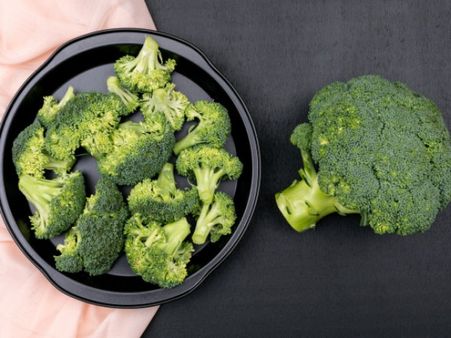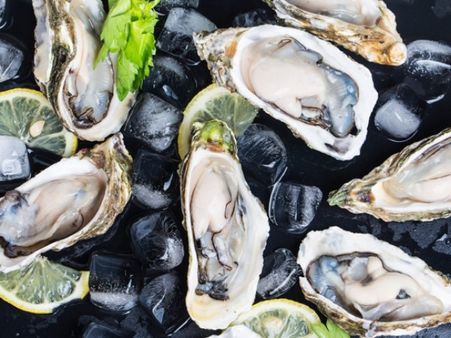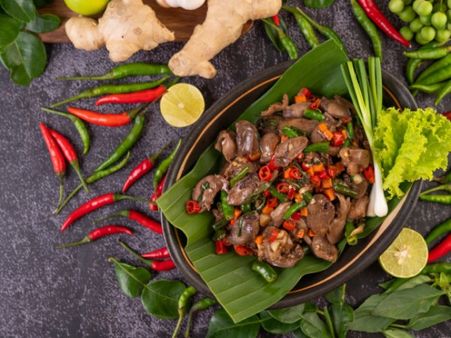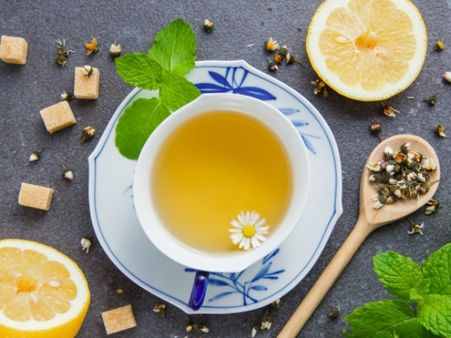Just In
- 1 hr ago

- 5 hrs ago

- 5 hrs ago

- 10 hrs ago

Don't Miss
- Finance
 1:3 Bonus Share, Rs 13.25/Share Dividend: Buy Maharatna PSU, TP Rs 355, Fundraise Approved
1:3 Bonus Share, Rs 13.25/Share Dividend: Buy Maharatna PSU, TP Rs 355, Fundraise Approved - Sports
 Who Won Yesterday's IPL Match 33? PBKS vs MI, IPL 2024 on April 17: Mumbai Indians Escape Last-Ditched Fight by Punjab Kings To Win
Who Won Yesterday's IPL Match 33? PBKS vs MI, IPL 2024 on April 17: Mumbai Indians Escape Last-Ditched Fight by Punjab Kings To Win - Movies
 Do Aur Do Pyaar OTT Release Date & Platform: When & Where To Watch Vidya Balan’s Film After Theatrical Run?
Do Aur Do Pyaar OTT Release Date & Platform: When & Where To Watch Vidya Balan’s Film After Theatrical Run? - News
 BRS Chief K Chandrasekhar Rao Slams BJP, Says K Kavitha's Arrest Is Vendetta Politics
BRS Chief K Chandrasekhar Rao Slams BJP, Says K Kavitha's Arrest Is Vendetta Politics - Automobiles
 Aprilia RS 457 Accessories: A Detailed Look At The Prices
Aprilia RS 457 Accessories: A Detailed Look At The Prices - Education
 Karnataka SSLC Result 2024 Soon, Know How to Check Through Website, SMS and Digilocker
Karnataka SSLC Result 2024 Soon, Know How to Check Through Website, SMS and Digilocker - Technology
 Nothing Ear, Ear a With ANC, Up to 42.5 Hours of Battery Launched; Check Price and Availability
Nothing Ear, Ear a With ANC, Up to 42.5 Hours of Battery Launched; Check Price and Availability - Travel
Telangana's Waterfall: A Serene Escape Into Nature's Marvels
Stressed During Lockdown? Dark Chocolate, Herbal Tea And Garlic Can Help You Feel Better
Since December 2019, the world has taken a u-turn. The Covid-19 pandemic has caused the world to a standstill. If you are feeling stressed and afraid due to the abrupt changes and shifts around the world, know that you are not alone.
Social distancing and lockdown have contributed towards breaking your routine, leading to uncertainty as to when life will go back to being 'normal.' Reduced social support and uncertainty about future events are some of the primary factors that can induce stress in a human mind.

The sudden disruption and isolation can cause one to freak out, especially the extroverts who thrive on social connection. That does not mean that it is just the socially-outgoing people who are affected by the lockdown and reduced or absent social gatherings.

While the world has already begun to embrace the 'new normal,' it is time you consider taking care of yourself to fit into the 'new norm,' advises mental health experts.

Stress During The Pandemic
Stress during an infectious disease outbreak can sometimes cause fear and worry about your health and the health of your loved ones, your financial situation or job, changes in sleep or eating patterns and difficulty sleeping or concentrating [1].
Reports reflect worsening of chronic health problems and mental health conditions, as well as increased use of tobacco, alcohol and other substances [2]. As mentioned before, some of the common causes of stress during the Covid-19 pandemic are uncertainty, lack of routine and reduced social support.
Stress can affect your health in adverse ways. Stress management is essential for good physical health, while short-term stress is normal and can help us change in positive ways, chronic stress can lead to a deterioration in your quality of life on a physical level [3][4].
Did you know that stress can affect your immune system?
Experts point out that stress can negatively affect the immune system. When an individual is anxious or feeling extremely down, the immune system tends to get weak and produce more stress hormones, reduce immunity and increase inflammation levels[5].
This poses a problem, especially during the Covid-19 pandemic when your immune system has to be on its best 'behaviour.' Instead of worrying about the current situation the world is in, doctors advise that people should focus on things that we can control, such as managing one's stress levels.

How Does Food Help Manage Stress Levels?
For more than a decade, studies have shown that a healthy diet high in fruits, vegetables, whole grains, fish and other lean protein can help manage stress levels [6]. When people have chronic stress, the gut microbiome gets out of control. It causes inflammation, which leads to inflammation in the brain, leading to elevated stress levels [7].
Consuming certain types of food can help fix the imbalance of good and bad bacteria in your gut and manage the stress levels. When you are in a state of anxiety, your body is in a fight-or-flight mode, causing the stress hormone cortisol levels to spike [8]. Eating the stress-reducing foods can help boost feel-good hormones and decrease cortisol levels.

Today, we will look at some of the foods that can help manage stress levels. All you have to do is eat ‘em!

1. Sweet Potatoes (Shakarakand)
Eating this nutrient-rich vegetable, that is a good source of carbohydrates can help lower levels of the stress hormone cortisol [9]. The vitamin C and potassium in sweet potatoes are beneficial for stress response.

2. Garlic
Garlic is high in sulphur compounds that help increase levels of glutathione, an antioxidant that can help reduce stress levels [10]. Studies have pointed out that regular consumption of garlic can help combat stress and reduce symptoms of anxiety.

3. Broccoli
A diet rich in cruciferous vegetables, especially broccoli, has been shown to help manage stress levels [11]. Broccoli is also rich in sulforaphane, a sulphur compound that has neuroprotective properties and may offer calming effects.

4. Avocado
This buttery fruit can lower stress levels due to their richness in omega 3 fatty acids, vitamin E, vitamin A and other essential nutrients. Omega 3 fatty acids uplift your mood and reduce stress and anxiety [12].


5. Turmeric
The active ingredient in turmeric, curcumin may help lower stress levels by reducing inflammation and oxidative stress. Studies point out that an increase of curcumin in the diet also increased DHA (omega-3 fatty acid essential for brain development) and reduced anxiety [13]. Turmeric with a pinch of black pepper can be consumed to improve your mood.

6. Chickpeas (Kabuli chana)
Equally tasty and beneficial for your health, chickpeas are packed with stress-fighting vitamins and minerals, including magnesium, potassium, B vitamins, zinc, selenium, manganese and copper [14]. Regular and controlled consumption of these legumes can help produce mood-regulating neurotransmitters, thereby managing the stress levels [15].


7. Blueberries
Blueberries are rich in antioxidants which make them beneficial for reducing stress. The flavonoid content in blueberries has been shown to improve mood and lower stress that follows with anxiety and depression [16].

8. Sunflower Seeds
A rich source of vitamin E, sunflower seeds acts as a powerful antioxidant and can help alter mood and improve symptoms of depression [17]. Sunflower seeds are rich in other stress-reducing nutrients, including magnesium, manganese, selenium, zinc, B vitamins, and copper. Pumpkin seeds are also equally beneficial.

9. Parsley (Ajamod)
A nutritious herb, parsley is packed with antioxidants that can help ease your stress levels [18]. Studies assert that consuming foods with good antioxidant levels may help prevent stress and low levels of anxiety.

10. Artichokes (Haathee chak)
Artichokes are considered a rare and exotic vegetable in India. Rich in magnesium, potassium, folate, vitamin C, iron and antioxidants, this exotic vegetable contains prebiotics like fructooligosaccharides (FOSs) that may help reduce stress levels [19].

11. Eggs
Eggs are rich in protein, choline, omega 3 fatty acids, B vitamins and other nutrients that can significantly improve your mood and manage stress levels [20]. Whole eggs are particularly rich in choline that has been shown to protect against stress.

12. Shellfish
Mussels, clams and oysters are rich in amino acids like taurine, which has been shown to have potential mood-boosting properties [21]. Taurine and other amino acids are needed to produce neurotransmitters like dopamine, which are essential for regulating the stress response.

13. Fatty Fish
Regular consumption of fatty fishes like salmon, herring, mackerel, trout, sardines and tuna that are rich in omega 3 fatty acids, vitamin B6 and vitamin B12 is known to help lower cortisol levels and beat stress [22]. Eat fatty fishes at least twice a week.

14. Organ Meat
Organ meats, such as, heart, liver and kidneys of animals like cows and chickens are a good source of B vitamins, especially B12, B6, riboflavin and folate, which can help manage stress levels [23].

15. Tahini
This Middle Eastern condiment is packed with various benefits for your body when consumed in a controlled manner. Rich in beneficial fatty acids, including omega-3 and omega-6, as well as good amounts of protein, potassium, manganese, calcium, iron, sodium and dietary fibre, tahini is also a rich source of the amino acid L-tryptophan that can help reduce stress [24].

16. Chamomile Tea
Chamomile has been used since ancient times as a natural stress reducer. Studies have proven that drinking chamomile tea can help reduce symptoms of anxiety, and thereby manage stress levels and also promote good sleep, something that is usually lost when the stress levels increase [25].

17. Dark Chocolate
Consuming dark chocolate can help manage your stress levels in two ways: via its chemical impact and its emotional impact. Rich in antioxidants, consuming dark chocolate can help reduce stress by lowering levels of stress hormones in the body [26]. Be sure to enjoy dark chocolate in moderation.

18. Yoghurt
Yoghurt contains healthful bacteria, Lactobacillus and Bifidobacteria, which may produce an anti-inflammatory effect in the body, thereby reducing stress levels. This is because chronic inflammation may be partly responsible for anxiety, stress and depression [27].
Other foods that may help manage your stress levels are as follows [28]:
- Leafy green vegetables such as spinach
- Seeds like chia seeds and flaxseeds
- Nuts like Brazil nuts and almonds
- Oatmeal
- Citrus fruits such as grapefruit and mandarin
- Bananas
- Warm milk
- Red bell peppers
- Whole grains

Tips To Manage Stress Level During COVID-19 Pandemic
- Create a morning routine
- Check-in with your loved ones regularly
- Follow the recommended health guidelines
- Have a daily self-care ritual
- Limit news and media consumption
- Meditate and practice yoga

On A Final Note…
Doctors add that, how one responds to stress during the COVID-19 pandemic can depend on factors such as their background, social support from family or friends, financial situation, health and emotional background and the community one lives in.
While the above foods can help manage normal stress levels, people who have existing mental health conditions or have a substance use disorder should get professional help because foods cannot replace medicines, such as antidepressants.
-
 healthIs Office Stress Messing With Your Health? 5 Red Flags You Can't Ignore!
healthIs Office Stress Messing With Your Health? 5 Red Flags You Can't Ignore! -
 healthMental Health: Five Crucial Tips Every Stressed Out Student Should Know!
healthMental Health: Five Crucial Tips Every Stressed Out Student Should Know! -
 healthWorld Heart Day: 5 Habits That Can Improve Heart Health Other Than Exercise And Diet
healthWorld Heart Day: 5 Habits That Can Improve Heart Health Other Than Exercise And Diet -
 healthGain Control of Your Stress and Guard Your Heart!
healthGain Control of Your Stress and Guard Your Heart! -
 healthUnlock the Magical Stress-Busting Power of Indian Spices and Herbs
healthUnlock the Magical Stress-Busting Power of Indian Spices and Herbs -
 healthDid You Know That Chronic Stress Can Affect Menstruation And Vice Versa?
healthDid You Know That Chronic Stress Can Affect Menstruation And Vice Versa? -
 healthScented Wellness: Unraveling Aromatherapy's Powerful Healing Benefits
healthScented Wellness: Unraveling Aromatherapy's Powerful Healing Benefits -
 healthOnam Work-Life Balance: 5 Expert Tips To Enjoy The Festival Stress-Free
healthOnam Work-Life Balance: 5 Expert Tips To Enjoy The Festival Stress-Free -
 healthFrom Mind To Gut: The Surprising Connection Between Stress And Digestion
healthFrom Mind To Gut: The Surprising Connection Between Stress And Digestion -
 beautyHair Loss From Stress? Try These Ayurvedic Remedies
beautyHair Loss From Stress? Try These Ayurvedic Remedies -
 healthPTSD Day: 4 Common Causes Of Post Traumatic Stress Disorder
healthPTSD Day: 4 Common Causes Of Post Traumatic Stress Disorder -
 healthFeeling Anxious And Jittery? Avoid These Foods When You Are Stressed!
healthFeeling Anxious And Jittery? Avoid These Foods When You Are Stressed!


 Click it and Unblock the Notifications
Click it and Unblock the Notifications




